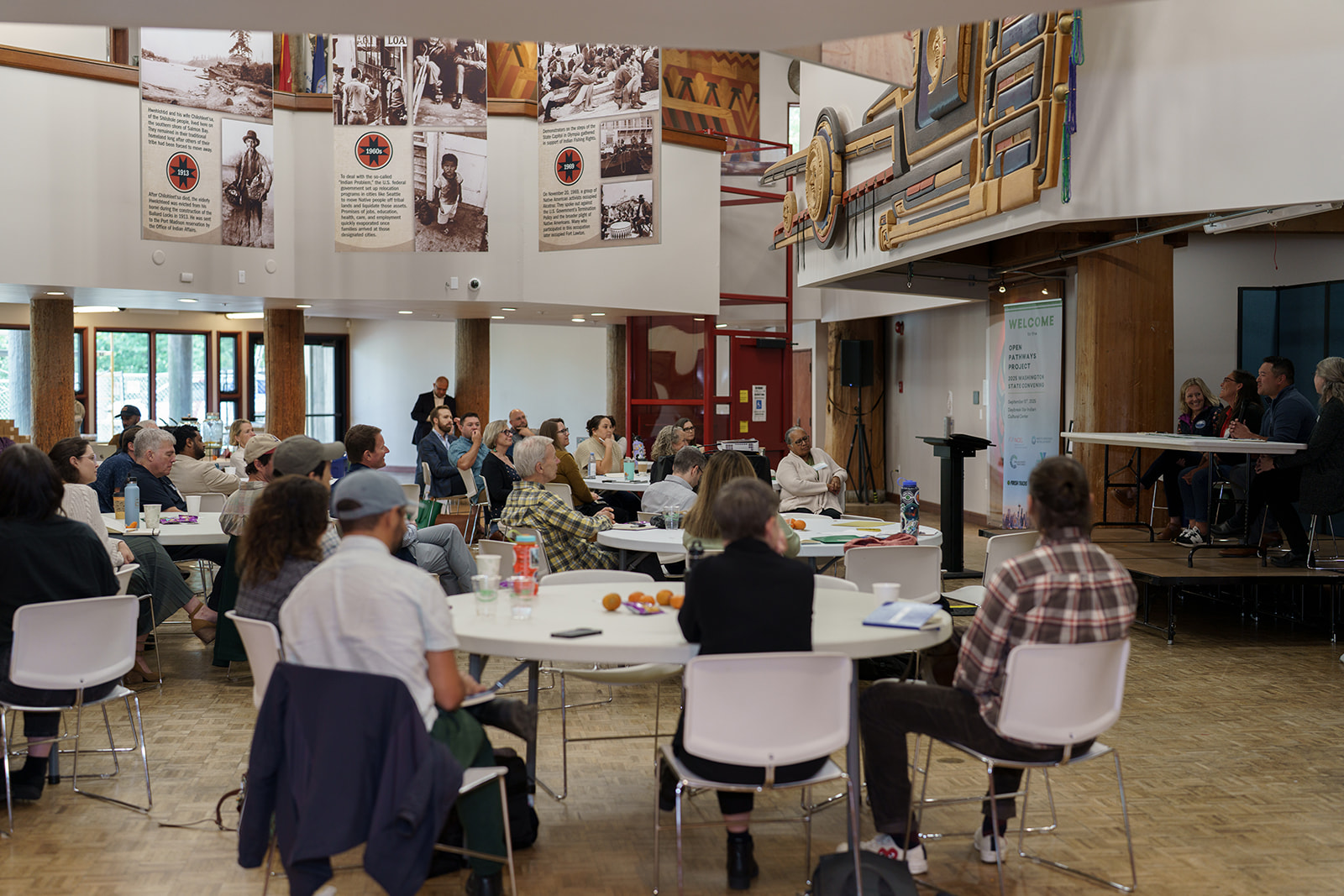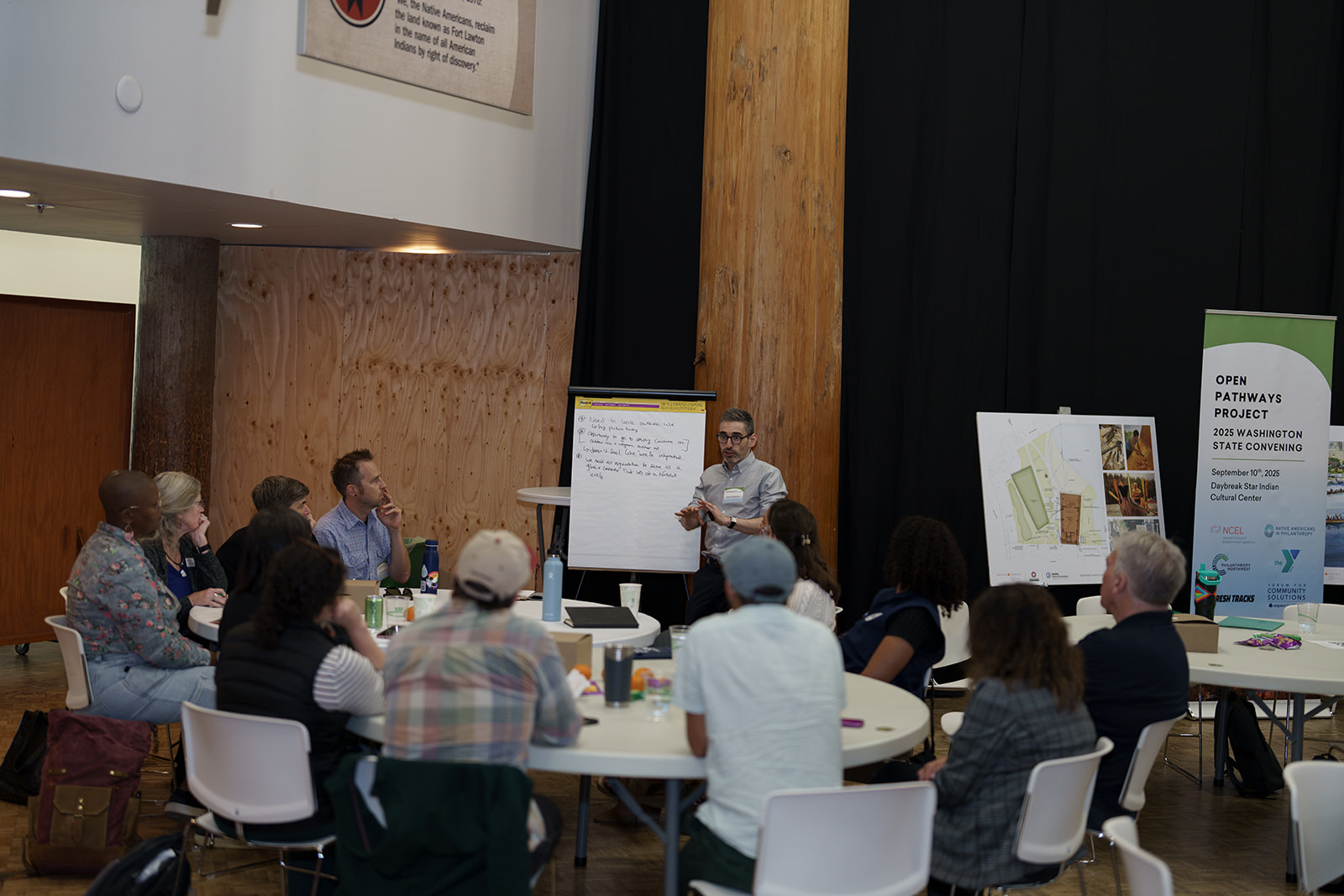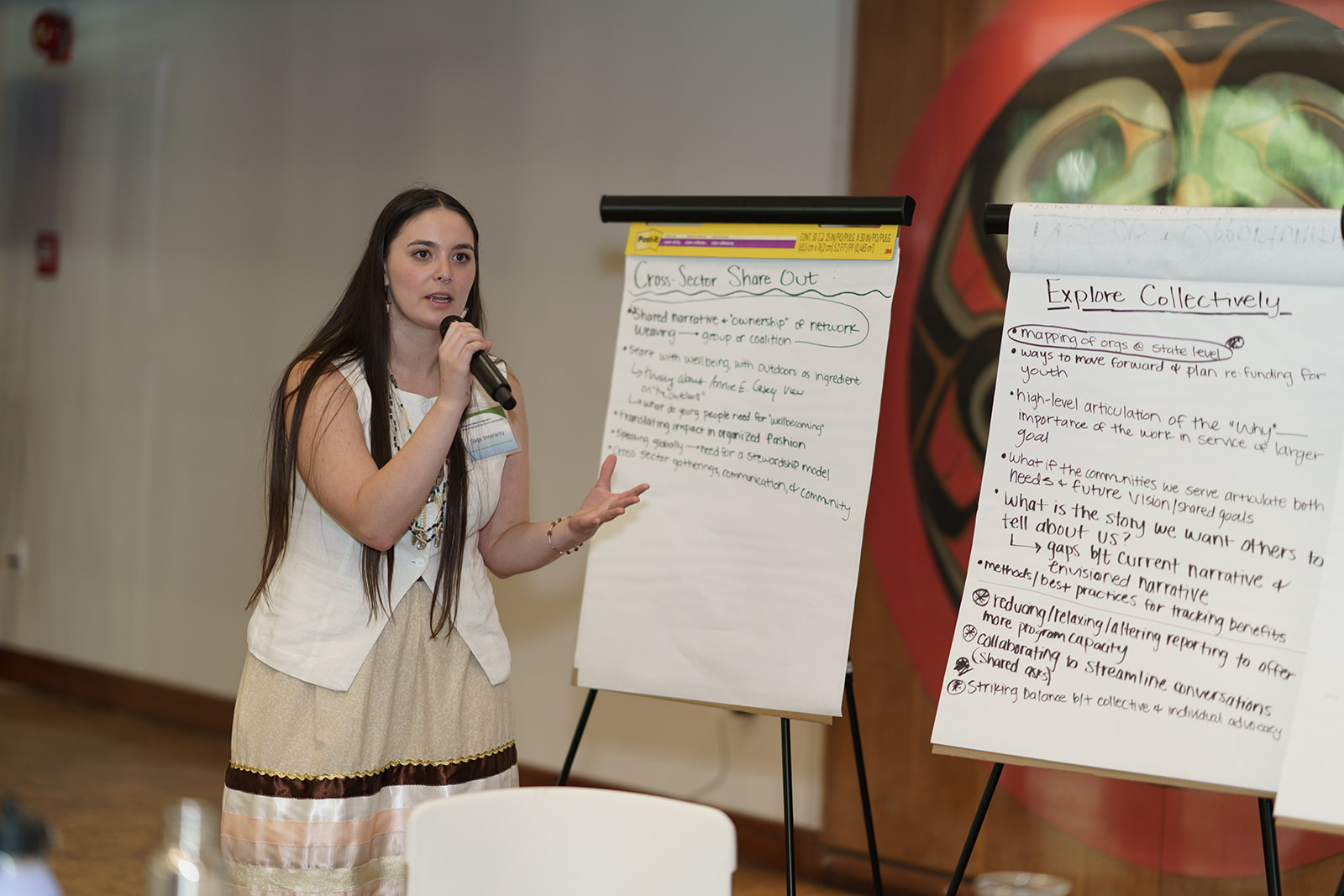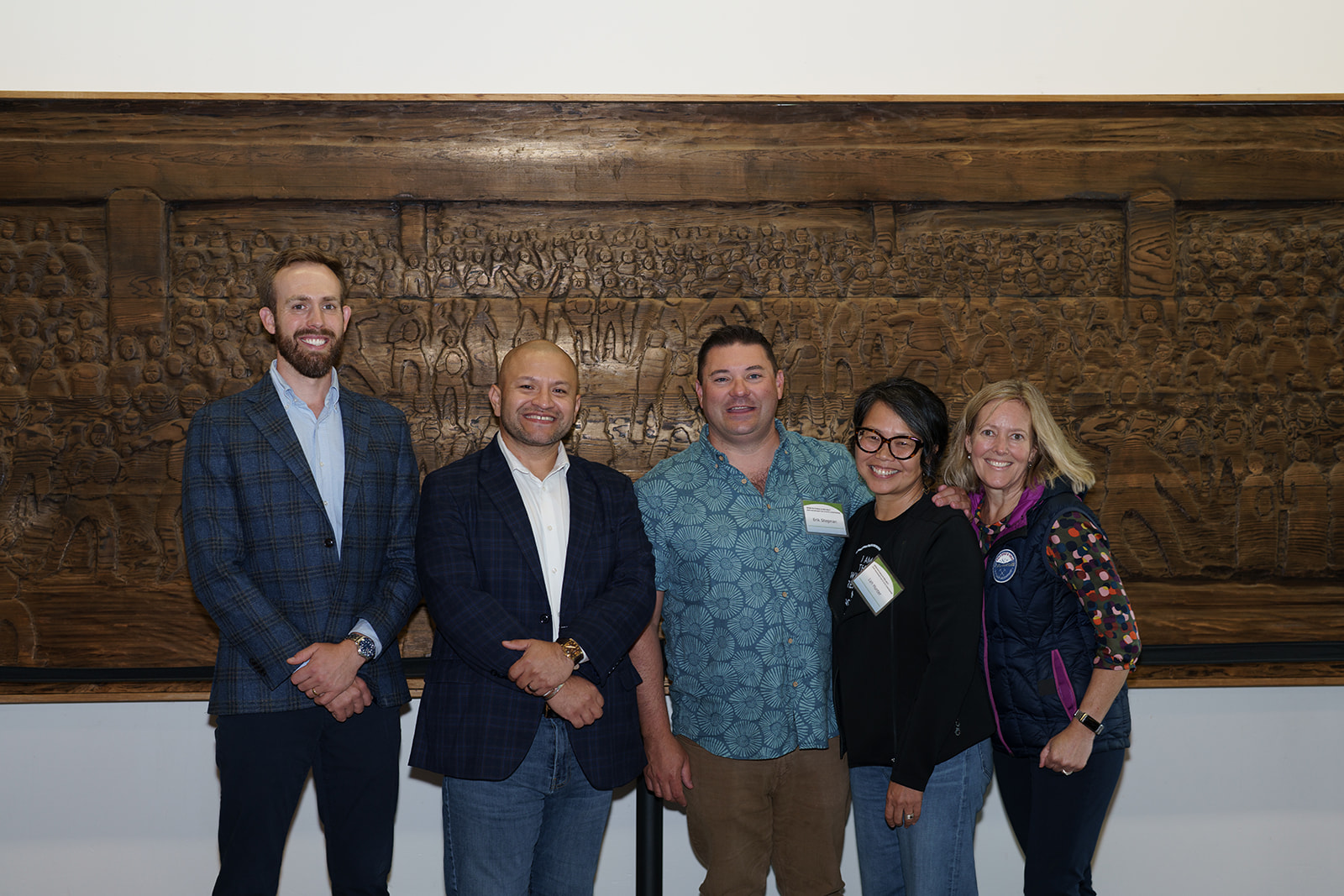I. Introduction
Fresh Tracks has a longstanding commitment to Indigenous values and voices, with a particular emphasis on the power of culture and the outdoors to foster community wellbeing. For many years, we put these values into action through direct youth leadership engagement through programs like Fresh Tracks Trainers, the Native, Indigenous, and Tribal Community of Practice, and Youth Participatory Action Research (YPAR) projects like the Wellbeing Measures Tool.
If our work and the communities we serve have taught us anything, it is that we are stronger when we come together. As connectors and weavers, however, we recognize that seemingly segmented movements and leaders are often working toward the same vision: a future in which all people, and youth in particular, have access to the power of culture and the outdoors to create wellbeing.
Rooted in Indigenous values and led by the communities most impacted by systems of inequity, Fresh Tracks connects people, policy, and philanthropy in service of generational healing and collective action. At its core, Fresh Tracks is about the belief that well-being is not an individual pursuit, it is a community outcome achieved through connection to culture and the outdoors.
Over the years, an urgent need has emerged for philanthropy, policy, and programming– sectors which have only become more isolated over time– to find and create common ground. Grounded in the belief that the work of these sectors is inherently connected, Fresh Tracks is meeting this challenge through the Open Pathways Project (OPP).
OPP, a platform of the Aspen Institute and Fresh Tracks, is partnering with the National Caucus of Environmental Legislators, The YMCA, and Native Americans in Philanthropy. By convening partners across philanthropy, policy, and programs at the state level, OPP is helping to secure a stable future for outdoor access for generations to come and create a national platform of state-led solutions
II. The Washington Context
OPP as a strategy is an extension of Fresh Tracks’ commitment to building bridges toward ensuring that community and youth-led solutions are centered in outdoor equity and well-being policy. Given its beloved culture of centering and valuing outdoor engagement, Washington state served as the natural choice to pilot the Open Pathways Project.
Washington is home to countless successful outdoors initiatives, including the passage of the No Child Left Inside Act, early work to establish Nature Preschools, and the creation of a dedicated recreation position within the governor’s office. Still, the 2022 Building Stronger Roots report revealed that while “92% of survey respondents indicated that collaboration is useful, the collective grade of the current effectiveness of collaboration indicates a failing grade of 47 out of 100.”

Grounding presentation by CJ Goulding, Executive Director of Boyz in the Wood and co-author of the Building Stronger Roots report.
In the face of declining funding, opportunities for meaningful engagement in the outdoors are increasingly limited. Now more than ever, advocates, policymakers, program leaders, and funders must come together to find innovative ways to collaborate and leverage resources in service of maintaining outdoor engagement. The Open Pathways Project is stepping up to meet this urgent need.
III. Breaking Silos to Build Collective Power
Driven by Fresh Tracks and the Aspen Institute, OPP seeks to bring leaders together across programming, policy, and philanthropy to break down barriers between sectors and catalyze deeper collaboration, with a goal of elevating the outdoors as a tool for community wellbeing. On September 10th, over fifty leaders across these previously-isolated sectors gathered as partners and cocreators of solutions for protecting and expanding outdoor engagement in Washington.

Open Pathways Project WA State Convening attendees listen to a programming panel featuring Serene Williams (Port Gamble S’Klallam Outdoor Education), Chase Buffington (Cispus Learning Center), and Kathryn Kurtz (Pacific Education Institute.
Featuring presentations and panels led by CJ Goulding (Boyz in the Wood), Lyn Hunter (Philanthropy Northwest), Courtney Aber (The YMCA), Dylan McDowell (NCEL), this convening uplifted success-stories at the state and national levels to forge a potential model for durable funding and policy and lay the groundwork for continued collaboration.
IV. What Grows When We Seed Collaboration?
The most powerful part of this day came during cross-sector breakout sessions led by the OPP Team. During these small-group discussions, leaders in policy, programs, and philanthropy began ideating on actionable strategies to address the challenges identified during panel discussions, a lack of integration between sectors, scarce time, and systemic barriers to collaboration.

Open Pathways Project WA State Convening attendees participating in cross-sector small group discussion led by Harris Solomon.
Washington’s leaders share a common vision for the future rooted in collective wellbeing, and believe the outdoors is critical for realizing this vision. They recognize the need for trust-based, cross-sector collaboration grounded in a unifying strategy. And they know that flexible, sustainable funding with young people at the center can elevate this movement. On this journey to common ground, the following takeaway emerged:
- Washington’s leaders need a shared narrative and strategy which leverages the interwoven strengths, resources, and experiences which policy, programming, and philanthropy can use to safeguard outdoor engagement.
- Trust-based collaboration requires an innovative, state-stewarded model for cross-sector connection and collective decision-making.
- Stakeholders seek to identify, contribute to, and invest in an ecosystem of outdoor engagement which centers young people’s sense of belonging, place, and wellbeing.

AFCS Program Coordinator Sage Innerarity (Ione Band of Miwok Indians) discussing key findings.
V. Conclusion
By convening leaders across philanthropy, programs, and policy at the state level, OPP is laying the groundwork for ongoing collaboration and innovative solutions to renew Washington’s commitment to outdoor engagement. Our goal is to build a national platform of state-driven recommendations, using existing knowledges to develop promising practices that can be shared at the state and national levels.
Grounded in Indigenous values of reciprocity and relationality, the Open Pathways Project is guided by our accountability to our most vulnerable communities and to future generations who will inherit the futures we create. Our collective legacy will be the opportunities we leave behind for future generations to thrive.
